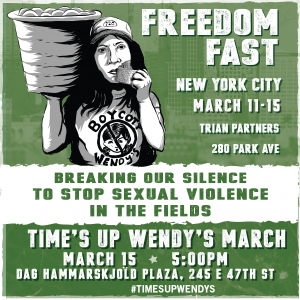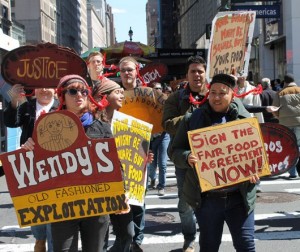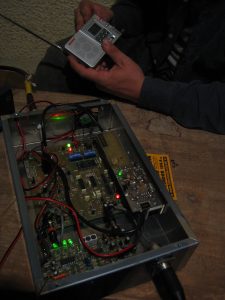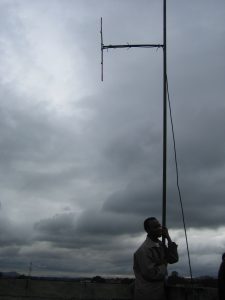Podcast: Play in new window | Download
The Freedom Fast and Time’s Up Wendy’s March
Immokalee, Florida was the site of some of the most brutal human rights atrocities in the United States. One third of all the nation’s tomatoes are grown there. Since 1997, the Justice Department has prosecuted seven slavery cases in Florida, four involving tomato harvesters. More than 1,200 persons have been freed from agricultural slavery rings in Florida during the last 10 to 15 years.
Workers report brutal beatings, being shackled in chains at night, not receiving regular pay, and having to share small quarters with dozens of others in a mobile home for $200.00 a month. They work without breaks, in the beating sun for 10 to 12 hours a day, seven days a week.
In 1993 a small group of workers who had been meeting in a church founded the Coalition of Immokalee Workers. Their mission was to improve the lives of tomato pickers in Southern Florida. After years of organizing in Immokalee, the Coalition launched its first boycott of a national of a fast food company—Taco Bell—in 2001. Four years later, the company agreed to support wage increases and workplace protections for tomato pickers. Since then, food corporations, including McDonald’s, Burger King, Whole Foods, Subway, and Walmart have followed suit. Today, 14 of the world’s largest food retailers and restaurants have signed fair food agreements with the CIW.
In May the Coalition will receive the Abraham Lincoln Brigade Archives and/Puffin Award for Human Rights Activism for their continued efforts to protect the rights of agricultural workers, prevent involuntary servitude, and create a food supply chain that is fair from bottom to top.
Guest – Lupe Gonzalo is a senior staff member and leader of the Coalition of Immokalee Workers (CIW). She has worked in the agricultural fields of the United States for the last 12 years as a migrant farmworker, including in the harvesting of tomatoes, citrus, peppers, and many other vegetables and fruits. As part of the Fair Food Program education team, Lupe and her colleagues conduct workers’ rights education in seven states along the East Coast throughout the year
Guest – Patricia Cipollitti, Patricia organizes alongside faith communities as part of her staff role within the Alliance for Fair Food. The Alliance for Fair Food is a national network of people working in partnership with the Coalition of Immokalee Workers for farmworker justice.
—-
The Prometheus Radio Project And LPFM
Where do you turn on your radio dial to hear diverse viewpoints, community voices, or even local musicians? If you’re like thousands across the country you might tune into Low Power FM or LPFM noncommercial broadcast stations. They operate at a lower transmission power and serve smaller areas than full power stations.
In 1999, the Federal Communications Commission launched the low power FM radio service, opening up an opportunity for community radio broadcasting in more than two decades. LPFM’s broadcast from 10 to 100 watts and are run by non-profit organizations, unions, schools, churches, and other local, non-commercial organizations. Today there are more than 800 low power radio stations on the air, committing to giving 8 hours a day of air time to local voices.
Law and Disorder is thrilled to be carried on several LPFM stations but it hasn’t been an easy road. Early on, corporate sponsored big broadcasters have pushed Congress to limit low power radio as soon as it started. Fortunately, The Prometheus Radio Project fought for years to support the Local Community Radio Act that would return authority to the FCC, and allow them to license low power stations in cities for the first time.
Guest – Paul Bane got hooked on Grassroots Radio by listening to Boulder’s KGNU in the mid 90’s. That also led him into activism for global economic dignity in the “Seattle-era” street movement. Along the way he also stood against police brutality, for an end of racism toward Native Americans and others, an end of media bias including that at NPR, of discrimination and dehumanization aimed at women, LGBT, and undocumented immigrants. When he co-founded Grassroots Radio station KRFC between 1997 and 2003, he also co-founded its news collective. After chatting with Prometheus at Grassroots Radio Coalition conferences for a decade or so and leaving his Fortune 100 R&D job, Paul volunteered at Prometheus in 2010 and is currently our nerdiest engineer. His electrical engineering degree and ham radio experience comes in handy for FCC application engineering, station design, construction and troubleshooting. Paul also created and maintains the free-to-use RFree software to make application engineering easier.
—————————————————



